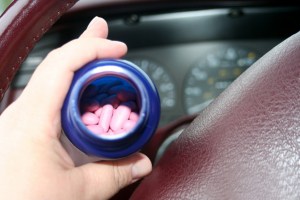The Dangers of Drugged Driving and the Consequences in Tennessee
 In the same way that drinking and driving is hazardous, drugged driving, which is getting behind the wheel while under the influence of illicit drugs or prescription drug, puts both the driver, their passengers and the other drivers on the road in danger.
In the same way that drinking and driving is hazardous, drugged driving, which is getting behind the wheel while under the influence of illicit drugs or prescription drug, puts both the driver, their passengers and the other drivers on the road in danger.
According to the National Survey on Drug Use and Health (NSDUH), approximately 9.9 million people aged 12 and over (3.8 percent of teens and adults) reported driving under the influence of illicit drugs in the year prior to the survey (2013). In 2012 the rate was higher (3.9 percent). This is in comparison to an estimated 28.7 million people (10.9 percent) who reported driving under the influence of alcohol at least once in the past year. (SAMHSA 2014)
Drugged driving includes driving under the influence of any drug that can do the following:
- Impair judgement and response time
- Decrease motor coordination
- Cause dizziness and drowsiness
Any of these substances can cause the driver to get into an accident including cocaine, marijuana and methamphetamines, but it can also include:
- Prescription drugs
- Over-the-counter medications
- Sedatives
The challenges presented by drugged driving and the law
Because scientists are not as clear about exactly how much of a drug will impair their ability to drive, it is challenging to come up with a hard and fast rule such as the BAC (blood alcohol content) that is used to determine a person’s level of alcohol impairment. There is also not yet a definitive roadside test to measure drug levels in the body.
The BAC of 0.08 percent is the legal limit for driving under the influence of alcohol in Tennessee, although a person may be convicted of DUI even if their blood alcohol level is below 0.08 percent. Under Tennessee law, a person can be found guilty of a DUI if he or she drives or is in physical control of any motor vehicle while under the influence of any intoxicant, marijuana, or narcotic drug.
Marijuana, after alcohol, is the drug that is linked to drugged driving. Blood tests for detecting marijuana measure the levels of delta-9-tetrahydrocannabinol (THC), which is the drug’s active ingredient. In a study of drivers in Australia, of more than 3,000 who were fatally injured in auto accidents, the drivers with THC in their blood were much more likely to have been at fault in the accident than the drivers who did not have alcohol or drugs in their bodies. The likelihood of causing an accident increased as the level of THC in the blood increased.
Those who think that marijuana is harmless, or that it won’t make a difference if they drive after taking prescription drugs that impair their judgement are mistaken. Just like drinking and driving, taking any kind of drug that will impair your ability to drive safely makes you a hazard to yourself and everyone who shares the road with you.
If you have been arrested for a DUI, the criminal defense attorneys at the Law Offices of Adrian H. Altshuler & Associates are ready to meet with you and discuss your case. We will listen to you and then advise you of your legal options. Contact us today and schedule a consultation.
